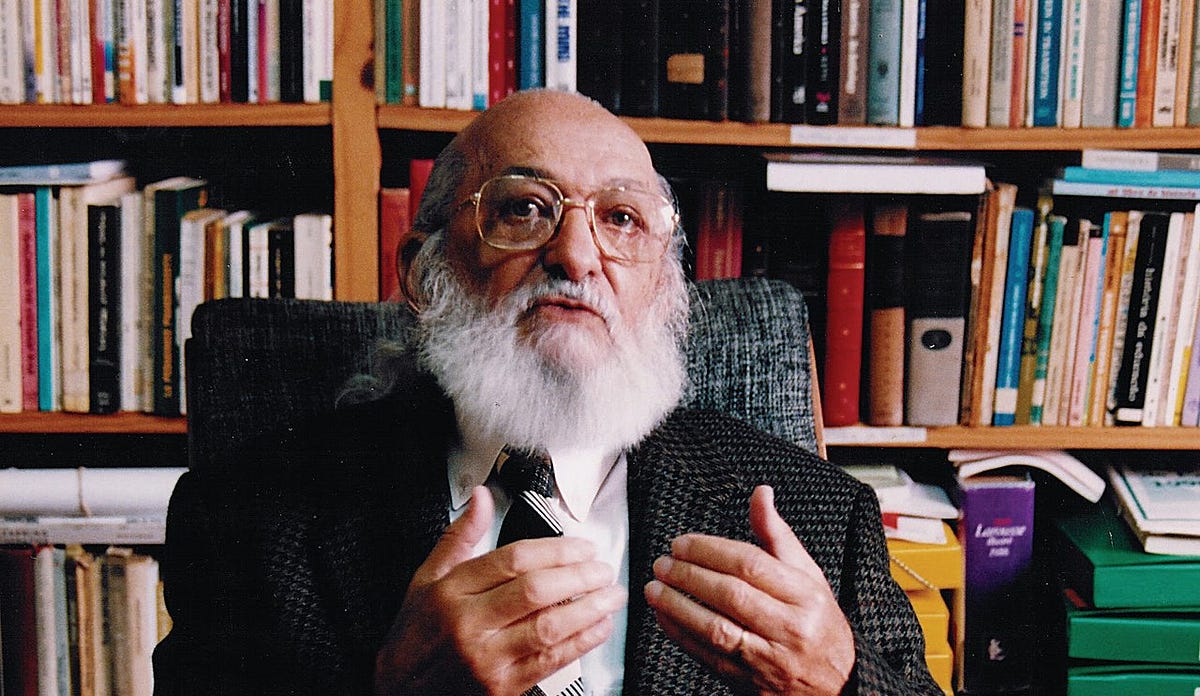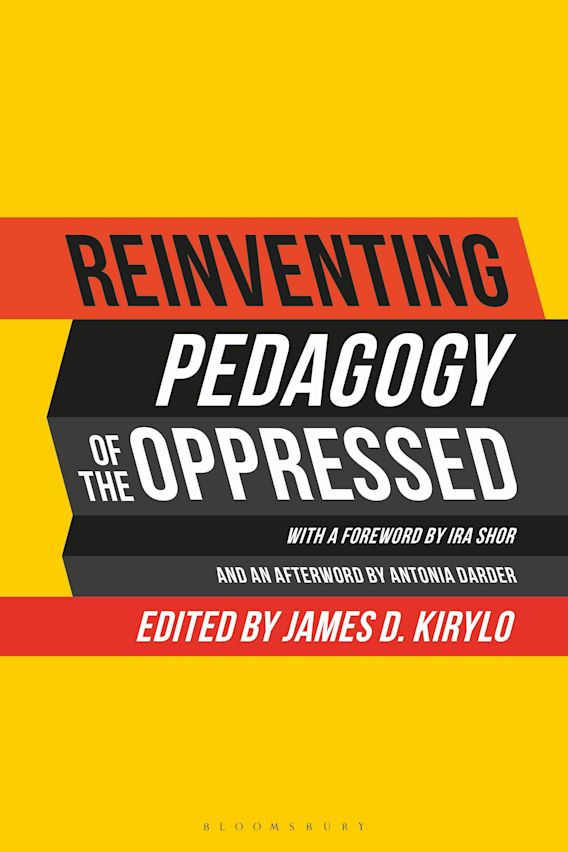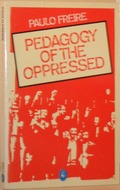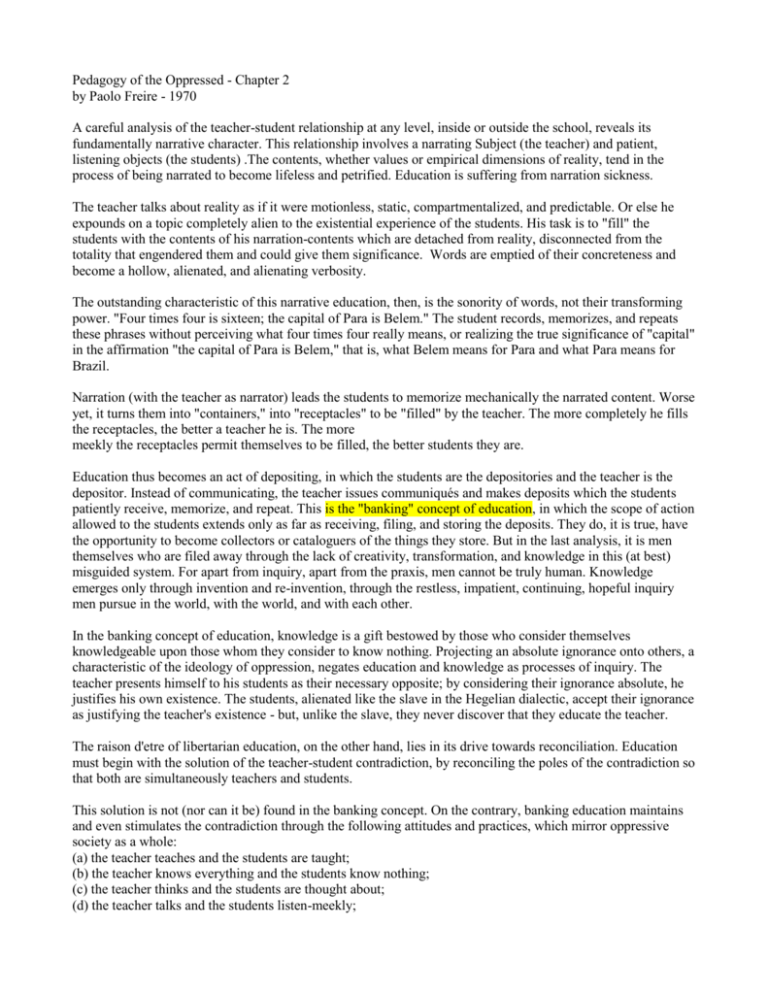Pedagogy Of The Oppressed Chapter 1 Summary
A Revolutionary Approach to Education: A Summary of Pedagogy of the Oppressed Chapter 1
Education has always been a powerful tool for shaping society and influencing the minds of individuals. However, in Paulo Freire's groundbreaking book, "Pedagogy of the Oppressed," he challenges traditional approaches to education and advocates for a revolutionary approach that empowers the oppressed. In this article, we delve into Chapter 1 of Freire's book to understand his perspective and explore its implications.
Understanding Oppression: The Banking Concept of Education

In Chapter 1, Freire introduces the concept of the "banking" model of education, which he argues perpetuates oppression. According to this model, teachers deposit information into the minds of passive students who are expected to absorb and repeat it without critical thinking. The goal is to maintain the status quo rather than inspire transformative action.
This approach restricts creativity and inhibits the development of critical consciousness, leaving students trapped within oppressive systems. Freire suggests that true education should encourage dialogue, empower students as active participants, and foster critical thinking.
The Need for Dialogue: Problem-Posing Education

Freire proposes an alternative approach called problem-posing education. In this model, teachers and students engage in a dialogue where both parties contribute knowledge and learn from one another. Rather than being passive recipients, students actively participate in the learning process, shaping their own education.
Problem-posing education promotes critical consciousness, empowering students to question societal norms and challenge oppressive systems. Through dialogue and reflection, individuals gain a deeper understanding of the world and their role in transforming it.
The Role of Liberation

As Freire emphasizes, the goal of education should be liberation from oppression. Liberation involves not only understanding existing power structures but also actively working towards dismantling them. Education should provide individuals with tools for analyzing and critiquing society, enabling them to pursue social justice and equality.
Freire argues that authentic liberation cannot be achieved without the active participation of the oppressed. He rejects the notion of education as a mere transfer of knowledge, advocating for an education that empowers individuals to become agents of change.
Frequently Asked Questions (FAQs)
Q: How does Freire define oppression?
A: For Freire, oppression refers to any form of social, political, or economic domination that hinders individuals' freedom and limits their access to equal opportunities.
Q: Can the banking model of education be completely eliminated?
A: Freire suggests that it is possible to transcend the banking model through problem-posing education. However, he acknowledges that remnants of the banking concept may persist in educational systems deeply rooted in oppressive structures.
Q: How can problem-posing education be implemented in practice?
A: Implementing problem-posing education requires shifting the role of teachers from mere transmitters of knowledge to facilitators of critical thinking and dialogue. Creating a safe and inclusive learning environment that encourages student participation is also crucial.
Similar Topics to Pedagogy Of The Oppressed Chapter 1 Summary
- Freire's Critique of the Traditional Education System
- Educational Empowerment: Fostering Critical Consciousness
- Redefining Pedagogy: From Banking to Problem-Posing Education
In conclusion, Chapter 1 of Paulo Freire's "Pedagogy of the Oppressed" introduces us to the transformative potential of education. By challenging the traditional banking concept of education and advocating for problem-posing education, Freire encourages continuous dialogue, critical consciousness, and active participation. Through this approach, individuals can break free from oppression, become agents of change, and work towards a more just and equal society.
References:
- Freire, P. (1968). Pedagogy of the Oppressed. London: Penguin Books.Summary: Paulo Freire, Pedagogy Of The Oppressed (1968), Chapter 1 | By
 Image Source : blacklamprg.medium.com
Image Source : blacklamprg.medium.com Pedagogy Of The Oppressed Chapter 1 Summary Paulo Freire Critical
 Image Source : www.otosection.com
Image Source : www.otosection.com Freire Pedagogy Of The Oppressed Summary. Pedagogy Of The Oppressed
 Image Source : api-stg.3m.com
Image Source : api-stg.3m.com Pedagogy Of The Oppressed Chapter 2 Summary | FreebookSummary
 Image Source : freebooksummary.com
Image Source : freebooksummary.com pedagogy oppressed summary chapter freebooksummary doc registered whole users open only available
Pedagogy Of The Oppressed: Chapter 1 Summary| Paulo Freire| Critical
 Image Source : www.youtube.com
Image Source : www.youtube.com pedagogy oppressed
Freire Pedagogy Of The Oppressed Summary. Pedagogy Of The Oppressed
 Image Source : api-stg.3m.com
Image Source : api-stg.3m.com Paulo Freire Pedagogy Of The Oppressed Chapter 1 Summary Sophjan 🚨 - Coub
 Image Source : coub.com
Image Source : coub.com Pedagogy Of The Oppressed - Chapter 2
 Image Source : studylib.net
Image Source : studylib.net Pedagogy of the oppressed: chapter 1 summary| paulo freire| critical. Pedagogy of the oppressed chapter 1 summary paulo freire critical. Pedagogy oppressed. Pedagogy of the oppressed chapter 2 summary. Freire pedagogy of the oppressed summary. pedagogy of the oppressed